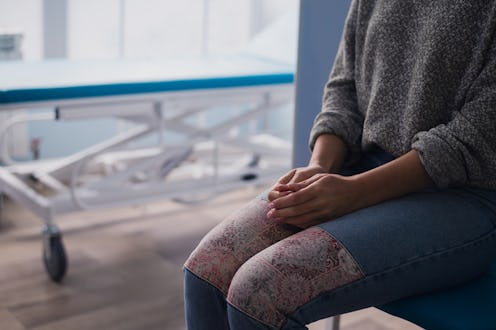Life
What Mental Health Experts Want You To Know About Survivor’s Guilt

Over the past week, news about three reported suicides involving people whose lives were affected by mass shootings sparked national conversations abut gun violence and the long-term effects of trauma. Sydney Aiello, who survived the mass shooting at Marjory Stoneman Douglas High School in Parkland, Florida, was diagnosed with post-traumatic stress disorder (PTSD) before dying by suicide, and her mother told CBS Miami that she had been struggling with survivor's guilt. Many experts have highlighted the importance of recognizing and treating these conditions, which may not necessarily present themselves immediately after a trauma.
Survivor’s guilt refers to “the literal experience of someone surviving a man-made or natural traumatic event while the other person did not,” Paraskevi Noulas, PsyD, clinical assistant professor of psychiatry at NYU Langone Health, tells Bustle. She cites examples like surviving a car accident that was fatal for other passengers, living through a school shooting that resulted in other individuals’ deaths, or surviving a natural disaster where other people died. “The essence of survivor’s guilt is a feeling of powerlessness and helplessness. It can be a feeling [of] anger, even rage towards the perpetrator(s) and/or towards oneself for not being able to do more to protect the loved one.”
Survivor’s guilt can sometimes be a component of PTSD, a condition where a person has difficulty recovering after experiencing or witnessing a traumatic event and experiences intense emotional and physical reactions to triggers of that event. But the two can exist independently of each other, Ellen Hendriksen, PhD, clinical psychologist and published author, tells Bustle. “PTSD is more about avoidance. Imagine your life is a book. PTSD says, ‘I don't want to go back and read that particular page ever again,’” says Hendriksen. “By contrast, survivor's guilt reads the page over and over again, asking ‘What could I have done differently?’”
It's also worth noting that not everyone who experiences trauma will develop PTSD, according to the National Institutes of Mental Health, and not everyone who develops PTSD will become suicidal. Survivor's guilt is not an official diagnosis of itself, but pre-existing tendencies towards things like anxiety, depression, and self-criticism may also make someone more vulnerable to this phenomenon, as well as having experienced any sort of previous trauma, says Dr. Jean Kim, Clinical Assistant Professor of Psychiatry at George Washington University.
“Not everyone with PTSD has guilt about the event, although in a setting where there are mass casualties (e.g., mass shootings, combat), it is common for survivors to wonder what they could have done differently,” Sheela Raja, PhD, associate professor at the University of Illinois at Chicago, tells Bustle. “It's a way that your brain is trying to make sense of something that was so horrific and unpredictable.”
Dr. Kim says some ways to help recognize survivor’s guilt, in oneself or in others, include “signs of ruminating or focusing a lot on negative self-blame and guilt,” as well as making statements like “It's all my fault" or "I shouldn't have been the one to live." Significant shifts in mood, behavior, or concentration can be additional signs.
While it is typical for a person ask themselves difficult questions after surviving a traumatic event, Dr. Raja says people should seek help when these thoughts “are interfering with your ability to function — to work, go to school, concentrate, form relationships, and experience moments of some happiness.” Dr. Raja emphasizes that there is no "right" way to react in these traumatic situations, due to their inherently unpredictable circumstances. “Trauma therapists try to help survivors realize that they did the best they could under horrific circumstances,” she says.
When it comes to getting help, support from loved ones, friends, and peers is important. But it's also crucial to get professional help when dealing with PTSD or any other trauma-related disorders, says Dr. Noulas, as these aren't conditions that are likely to go away on their own. Psychotherapy or treatment from a licensed clinician can help a person process the events that they’ve survived, as well as teach strategies to overcome persistent negative thoughts and self-blame. Other resources include the National Child Traumatic Stress Network, and the 24/7 Disaster Distress Helpline, which is free and confidential.
“The sense of guilt feels factual, very real, as though there’s no question that they’re guilty or at fault; it can be quite challenging to reason with someone who’s experiencing survivor’s guilt,” says Dr. Noulas. “That’s why it’s so important to turn to professionals for treatment. Mental health providers are trained to properly address these issues and can help people work through their self-critical thoughts.”
If you or someone you know is seeking help for mental health concerns, visit the National Alliance on Mental Health (NAMI) website, or call 1-800-950-NAMI(6264). For confidential treatment referrals, visit the Substance Abuse and Mental Health Services Administration (SAMHSA) website, or call the National Helpline at 1-800-662-HELP(4357). In an emergency, contact the National Suicide Prevention Lifeline at 1-800-273-TALK(8255) or call 911.